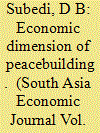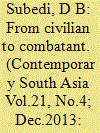| Srl | Item |
| 1 |
ID:
120083


|
|
|
|
|
| Publication |
2012.
|
| Summary/Abstract |
This article studies economic dimension of peacebuilding, concentrating on post-conflict economic recovery and development (PCERD) in Nepal. The current peace process in Nepal has a historical opportunity to address economic root causes of the armed conflict and lay a foundation for inclusive economic development. However, the economic dimension of peacebuilding has been sidelined by the contentious transitional politics in the Nepali peace process. Taking a maximalist approach to development, this article argues that PCERD in Nepal should be understood as a multiple-faceted long-term process which might incorporate both short-term and long-term priorities. While the short-term priority should target at delivering the economic dividends of peace in the immediate aftermath of the conflict, the long-term priority should be geared towards addressing the economic root causes of the preceding armed conflict as well as laying the foundation for an inclusive economic development. It should be accomplished by taking into account a wider range of the social, economic, political, psychosocial, and security related needs and aspirations of the conflict-affected people as well as the wider populace. Making an analysis from a political economy perspective, this article also discusses potential barriers to PCERD and finds that lack of commitment by the key political actors to engage in policy debates and discussions around economic recovery and development and dwindling post-conflict public security are the barriers to economic recovery and development in post-conflict Nepal.
|
|
|
|
|
|
|
|
|
|
|
|
|
|
|
|
| 2 |
ID:
127081


|
|
|
|
|
| Publication |
2013.
|
| Summary/Abstract |
Although combatants played a vital role in the People's War (PW) waged by the Maoists in Nepal, there is a dearth of knowledge about what motivated or compelled people to join the war, as well as what made the Maoists so successful in recruiting and mobilising committed insurgents. Engaging with these questions, this paper aims to understand the causes and drivers of combatant recruitment in the PW. The existing literature demonstrates that armed recruitment and participation in conflict is a phenomenon driven by structural and environmental factors in addition to other conditions, including class-based oppression as well as caste and ethnic grievances. This study, however, contends that in the Nepalese context, while such structural inequalities and disparities created favourable conditions for the PW to escalate, these factors alone cannot sufficiently explain: (a) how and in what ways the Maoists radicalised people or coerced them into becoming combatants and (b) what role the insurgent organisation and the state played in the recruitment dynamics. It argues that an understanding of armed recruitment and participation in the PW should also take into account certain mobilising factors, such as the Maoists' ideology and radicalisation campaigns. Furthermore, it situates the recruitment of combatants within the security paradigm and establishes that the insecurity and violence, caused by both the insurgent organisation and the state, explain voluntary as well as involuntary modes of armed recruitment in the PW.
|
|
|
|
|
|
|
|
|
|
|
|
|
|
|
|